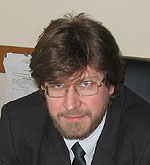© «Russia in
Global Affairs». № 1, January — March 2010
 The problems of
The problems of
national and global security have once again come to the fore in
recent months. Russia, the United States and other leading states
and their alliances (NATO and the Collective Security Treaty
Organization) are trying to adapt to the constantly changing
environment. In many cases, the reality outruns people’s mentality,
which remains a captive of views inherited from the past
decades.
The recently adopted Military Doctrine of Russia
continues to rank NATO first among probable “dangers” and insists
on the preservation of mobilization capacities in case of a major
conflict. Meanwhile, Vitaly Shlykov analyzes in this journal the
rapid and unprecedented transformation of the Russian Armed Forces.
He argues that the Soviet military organization, which was based on
mass mobilization, has been replaced by a modern army capable of
meeting 21st-century challenges. The architects of the military
reform actually (but not officially) proceeded from the assumption
that it is regional conflicts rather than world wars that threaten
Russia, which is at variance with the new doctrine.
Sergei Karaganov examines why the international
security agenda, now discussed in Moscow, Washington and European
capitals, is reminiscent of discussions of 30 years ago and where
it may lead. The “strategic havoc” was caused by the lack of
understanding of how to respond to the fundamental changes taking
place in the world.
Konstantin Kosachev writes about NATO-Russia
relations, now being rethought by both parties. In his view, the
negative experience gained by them during the Cold War and in the
post-Cold War years is the only obstacle to their practical
interaction. Objectively, Russia and the alliance have no
disagreement about the perception of real threats or the
interpretation of basic values. The author is convinced that Russia
and NATO can create a stable security system in Europe and in the
Northern Hemisphere as a whole only if they pool their efforts.
Nikolai Kapitonenko proposes opening a new page in
relations between Moscow and Kyiv: Russia and Ukraine can stop
being political antagonists and become close partners, if they
recognize their mutual security needs. Then, the author is
confident, the painful NATO membership issue will no longer be
relevant. Anton Lavrov’s article about the deployment of Russian
troops in Abkhazia and South Ossetia after the August 2008 war is a
reminder of the “hottest” page in relations between Russia and
Western countries in the recent past.
Still, the post-Soviet space remains an arena of
geopolitical and economic competition. Andrei Suzdaltsev analyzes
whether the Customs Union of the Eurasian Economic Community
(EurAsEC), formally in effect since January 1, can stop the
economic expansion of the European Union and China to former Soviet
republics. He argues that the Customs Union is a half-baked project
and that political motives behind it prevail over economic
calculations. Turkish Foreign Minister Ahmet Davutoglu writes about
regional conflicts and emphasizes that countries of a given region,
rather than external forces, must play the leading role in their
solution.
Alexei Bogaturov discusses the identity problem faced
by newly independent states, specifically in Central Asia, which
have to constantly maneuver between various centers of power.
Arkady Dubnov analyzes the development of Uzbekistan since it
gained independence and wonders why this country, which aspired to
play a prominent role in Asia, now is experiencing serious
political and economic problems. Svyatoslav Kaspe discusses why the
paths taken by Russia and other former Soviet republics are
diverging. He holds that this divergence will persist until Moscow
stops clinging to the vestiges of the Soviet identity.
Although the acute phase of the global economic
crisis is over, our authors continue studying its causes and
consequences. Maxim Shcherbakov points out the impotence of
economic science, which he explains by the habit of economic
experts to apply old instruments of analysis to the basically new
situation and to cling to “habitual axioms” instead of recognizing
the reality. Timofei Bordachev notes that researchers do not have
theoretical instruments yet that would let them analyze the global
economy as deeply as they analyze global politics. Vlad Ivanenko
holds that the scale and duration of economic problems have not
been fully understood yet and this is especially dangerous for
export-oriented countries, including Russia.










